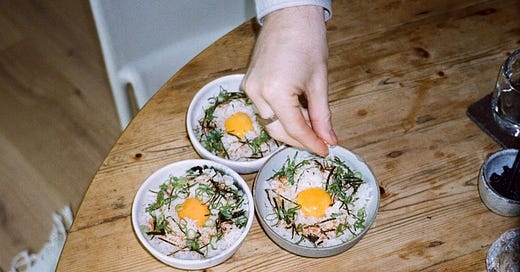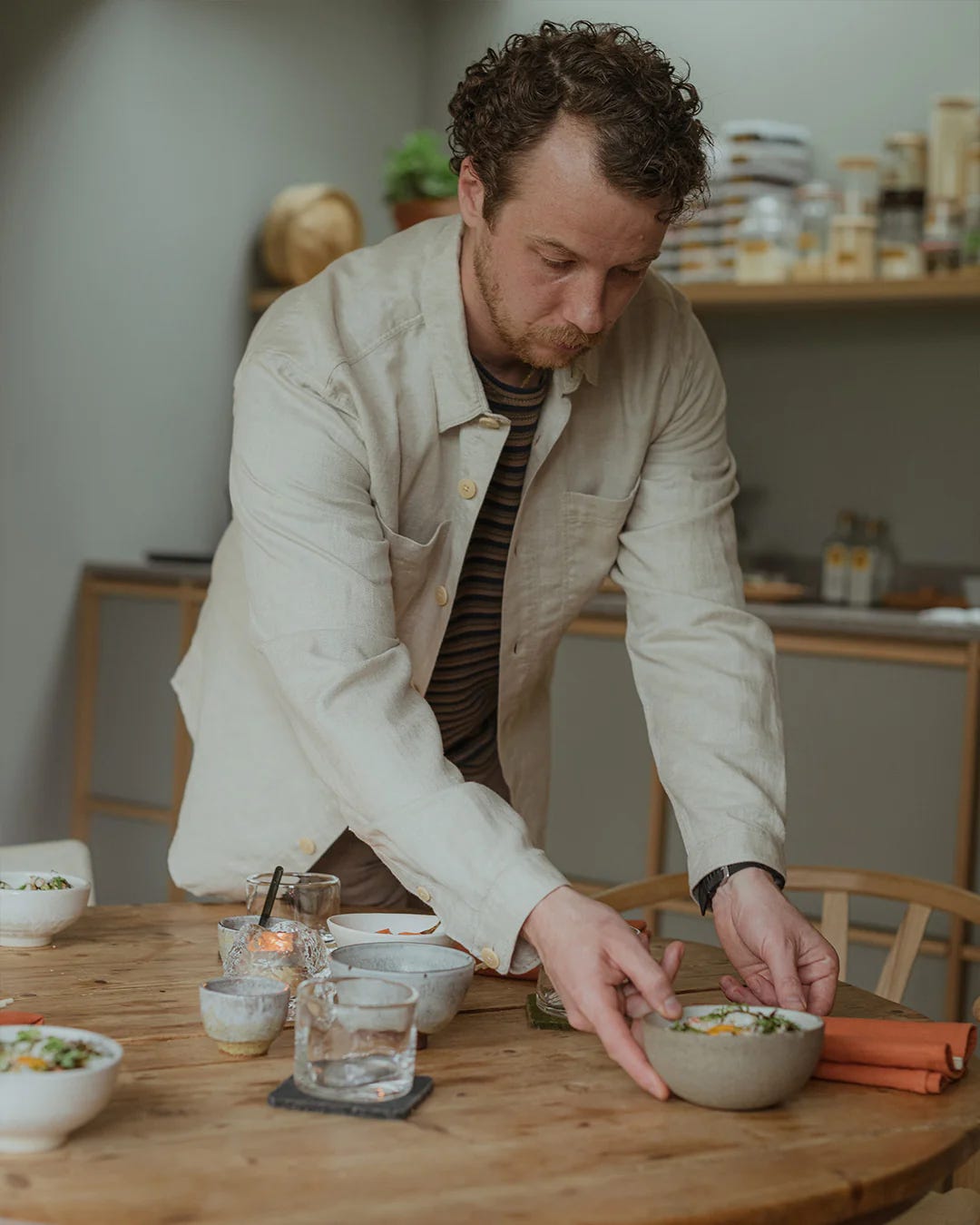Hello!
Thanks for joining us! The Ómós Digest is a reader-supported publication, of which all contributors are paid. Please consider supporting this continued writing, research, and expanding our amazing team by upgrading to a paid subscription for €5 a month or €50 a year. This newsletter brings you on that journey about the food you were looking for, or perhaps never knew existed. It is our quest to expand on what we don’t know and to share with those who care.
This week, I had the pleasure of welcoming retail and fashion expert, Andy Collins of Indigo & Cloth in Dublin, along with the talented photographer Babs Daly, to my home. The community series focuses the lens on customers & people Indigo and Cloth work with. The shoot involved dressing up in beautiful clothes chosen by Andy, and in return, cooking for him and Babs a dish that I typically prepare at home. Oh, how arduous! The shoot gave birth to this article, where I share how to make my favourite meal for one (or three), but more significantly, I explain why learning an eternal skill, like cooking sticky rice, is an investment worthy of your time.
Keep an eye on our Instagram to see next week’s images!
An eternal skill.
When Japanese short-grain rice is cooked as it was intended, little else stands in its way. It’s one of the world's greatest food types and learning how to cook it is one of life’s greatest culinary skills. I adore sushi, poke bowls and Japanese breakfasts. Even following a rich Thai curry, rarely will I turn my nose up at a mango sticky rice, doused in condensed milk. The accompaniments to each of these dishes are always wonderful, but for me, the star of the show is the perfectly sticky, catch-all mound that brings the dish together. I have a penchant for this kind of rice. In Japanese restaurants or izakayas, I have long marveled at its pearlescent quality, presuming a rice cooker was required to achieve such a godly quality. In truth, it's not the equipment but the application of the process that yields great results.
The ability to do something well is not to be overlooked. There is something undeniably humbling about acknowledging good work, invariably, a product of determination, repetition and care. What is more, learning a skill gives you a venerable ability to pass on said skill.
Almost a cliché at this stage, but when one ‘makes it look easy’, it’s no coincidence that it’s a hard-fought, devoted acquirement of attributed skill. We begin learning life skills from a tender age or as soon as the neurons in our brain develop. This includes hand signals, talking and walking to name but a few. When you are learning, important changes take place in your brain, including the creation of new connections between your neurons. This phenomenon is called neuroplasticity. The brain is made up of 85 million individual neurons, which can connect like a spider’s web. The more you practise or rehearse, the stronger these connections become. As your connections strengthen, the messages (nerve impulses) are transmitted increasingly faster, making them more efficient and resulting in tasks that once seemed hard becoming increasingly easy.
When one comes across a recipe with multiple steps and processes, the immediate impulse is to dissociate. These neophobic patterns prevail when tasks appear unfamiliar, complicated or daunting. The natural reaction is one of avoidance. If a dog runs the same course on a track every day for a year, vegetation will lessen and a clear pathway will form. However, as the dog ages, more and more seldom will it run that course, to the point of ceasing entirely and nature will naturally rewild the track to its original state. The same can be said about skills and neurons, the more we practise. This is self-improvement or learning. On the contrary, the connectivity of the neurons weakens and we become less clinical the less we apply our skills practically. Although an alarming prospect, there’s no need to panic. Intense practising or attribution of skill over time, makes some of these neural networks irreversible. This is where it really gets exciting. Like a song you spent days learning back when you were a teenager, even with years of not practising or even hearing the song, your brain remembers some if not all of its lyrics and melody. Thus, although you might not be as sharp as you were before, the skill you devoted time to back then has far from fully erased. It's become eternal in your memory. To me, this terminology is hugely applicable to cooking and is the founding reason why it is worth taking the time to master a recipe.
Last week while attending a wedding, I was asked at the dining table, what my desert island meal might be. Needless to say, it's a question I am frequently asked and one I should probably be more prepared for. That, and if ever I cook ‘normally’. Before I could answer, the questioner announced that his meal would commence with a starter of garlic bread, followed by Domino’s pepperoni pizza and finished with creme brulée. I think he may have been confused with a schoolboy’s death row meal, but I let it pass… In answering him, I probably should have read the room, but I proceeded by saying that a desert island meal for me, should be simple to prepare, considering you are alone on an island and at one with its elements. Imperishability would be pretty high on my priorities for that matter, and the amount of equipment would need to be kept to a minimum. In fact, a castaway lifestyle aligns with the methodology of the parameters I set out when cooking for one (see more on that below). Alas, this compounded with my announcement to the table that my desert island dinner would contain sticky rice (+ my inquirer’s misunderstanding of the term ‘desert island meal’). My answer was met with a series of dumbfounded blank stares… When I explained how it was made, he professed that the technique appeared far too complicated despite appreciating the texture of sticky rice in a restaurant. So I put it to them that although it might seem daunting at first, learning a technique like how to cook rice, is a worthy endeavour, especially when you acquire it for the entirety of your lifetime. Uncle Ben’s might satisfy hunger momentarily, but the ultra processed boil in the bag, is a far cry from a life skill of developing the ability to cook short-grain rice to the same standard as they have done in Japan or South East Asia for centuries. What's more, once acquired and mastered, naturally you will share this technique. Imagine how many people you might prepare it for throughout your lifetime. Beyond impressing, it’s appreciating the simplicity and purity of such a special tradition and practice. If you ask me, it’s a meritorious act and one worth investing the time in learning.






